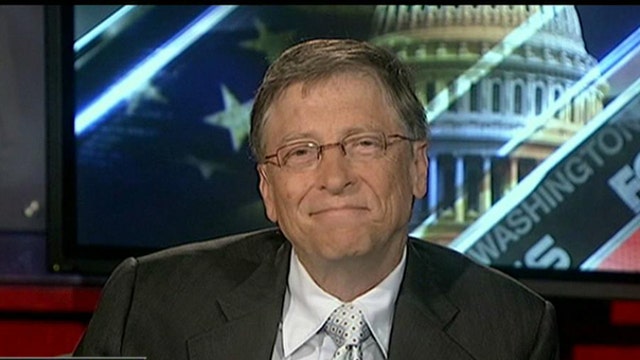Bill Gates Worried About ‘Deadlock’ of U.S. Government
Microsoft co-founder Bill Gates expressed frustration Thursday with a gridlocked U.S. government and said that philanthropic aid is crucial in preventing unstable foreign countries, which could spill over and eventually cripple the U.S.
In an interview with FOX Business Network’s Neil Cavuto, Gates also discussed what he sees as the “innovative” nature of philanthropy, and expressed the belief that passing his fortune on to his children wouldn’t be “good for the kid or society.”
“Right now, [the U.S. government] isn’t making decisions that lead to the government knowing what the budgets are going to be, and so it’s not a great situation right now … I’d look a tiny bit enviously at the parliamentary system, like [in] the U.K., where you’re voted into power – you can actually implement a lot of things,” Gates told Cavuto. “It’s not quite as veto-oriented.”
The uncertainty surrounding the federal budget is a cause of concern for Gates, whose Bill and Melinda Gates Foundation works alongside the U.S. government to provide international aid.
“I’m hoping that our system doesn’t end up in deadlock,” Gates said, before expressing cautious optimism that the government would find “its way back to the center, back to function.”
Regarding Gates’ expressed desire for strengthened presidential powers, Cavuto asked the global philanthropist to disclose his political leanings: “Is it fair to say you like the Obama agenda more than you like the Republicans’ agenda, because [Republicans] are against almost all of [your policies]?”
“Don’t peg me into any particular corner,” Gates said, adding that he views the areas of focus for the Gates Foundation – education reform, AIDS treatment and energy research – as bipartisan issues.
“I’m more of a technocrat … given a certain amount of money, I want to make sure it’s spent well. I want to make sure science and innovation are considered in those policies.
“The idea that teachers need feedback, and that we need to bring technology in because those costs are out of control. I think we’re making some progress in that because it’s not that partisan,” said Gates.
Gates also said that he views the agenda to increase energy research as a bipartisan initiative: “If we come up with the right energy thing then you … if it’s cheap enough, you get rid of these [subsidizations], which is where those gigantic costs come in.”
Misses Full-Time Tech Work; Apple’s ‘Unbelievable,’ MSFT’s ‘Crazy Incredible’
In terms of balancing his commitment to the Gates Foundation with his work for Microsoft (NASDAQ:MSFT), Gates said he gets to spend about 15% of his time on technology, with the rest of his energy devoted to philanthropy.
“I’ve certainly missed being full time on all that stuff,” said Gates.
When pressed on whether perhaps the “luster is gone” from Apple (NASDAQ:APPL) in the wake of Samsung’s dynamic unveiling Thursday of the Galaxy S 4 phone, Gates had only supportive comments with regard to today’s industry giants.
“I think Apple’s an unbelievable company. Obviously I think Microsoft [is a] crazy incredible company. The work between Google (NASDAQ:GOOG), Samsung, Microsoft, Apple, the work we’re doing to give consumers and people unbelievable tools where you’ll have voice recognition, you’ll have intelligent white boards, you’ll be able to visualize data,” said Gates.
“That is a cool sector of the economy and the only reason I don’t feel bad about not being there full-time is that this philanthropy stuff is equally exciting,” he added.
Less Government, More Giving
The innovative billionaire also said that philanthropic spending can actually fuel further innovation and the adoption of more successful programs than those funded by government, because organizations like his can take greater risks.
Philanthropy “tends to be more innovative, more willing to take far-out science, new delivery programs … it’s almost like the venture capital of societal spending. Sometimes you take on things like, you know, we’re trying to get teachers to have more feedback and raise the average quality. Those programs might or might not succeed and it’s not the typical thing a government would do,” said Gates.
Need for Global Health Initiatives; Fortune’s Future
The Microsoft co-founder also views public health spending as necessary for the nation’s security, making it in his opinion a particularly valuable category in terms of federal spending.
“By saving those lives you avoid the kind of population growth and instability that lead to huge national security issues. You know, countries like Nigeria, Yemen -- if we let them triple in population because we don’t help out with their health issues, we’re going to have huge costs and instability,” he said.
With regard to spending his personal fortune, Gates echoed the sentiments of his friend and Gates Foundation donor Warren Buffett, who has made public his intentions for his wealth to be fully spent by his own foundation within ten years after his death.
Gates said that his children are aware that they will not be inheriting the lion’s share of his fortune: “Our foundation is set up so after the last of Melinda and I are gone, our foundation will spend its money within 20 years.”
While he’s not ensuring that his children will never have to work, he said that they are “excited” about the foundation’s work, and “they’ll get a great college education and some support, so they’re very, very lucky.”




















